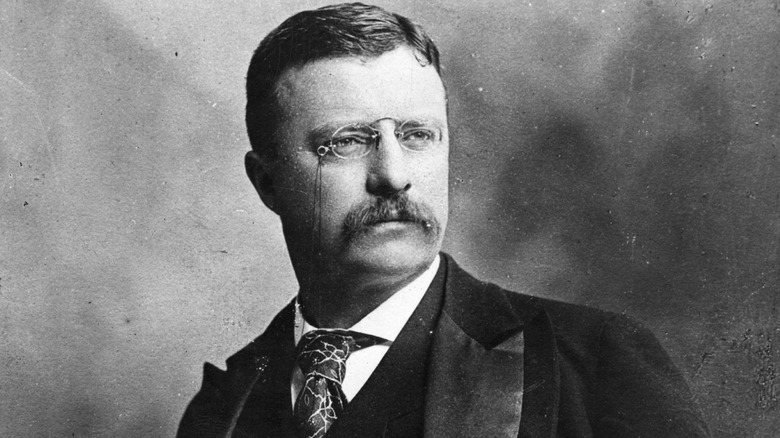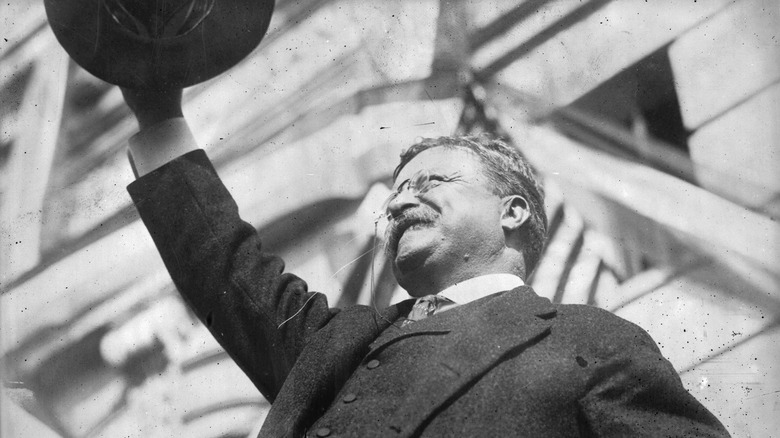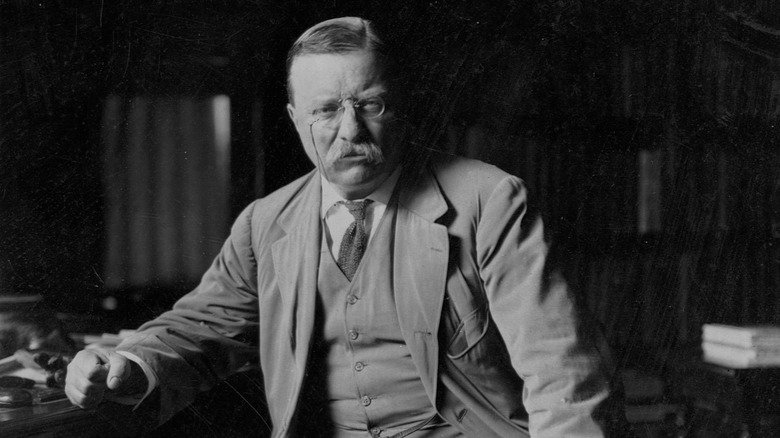Teddy Roosevelt Holds This Impressive Record For American Presidents
He's a face on Mount Rushmore. One of the most beloved children's toys in history is his namesake. The internet is rife with variations on the meme of him riding a dinosaur. But as fun as it is to print these legends, the truth about Theodore "Teddy" Roosevelt is just as fascinating. His accomplishments as the 26th president of the United States have carved him out a prominent place in turn-of-the-century history: the Square Deal, busted trusts, the Panama Canal, and the national park system. And he did all that having begun his time in office at 42 — to date the youngest man ever to hold the presidency.
He wasn't elected president at that age, though. So while he is the youngest man to become president, he ranks behind John F. Kennedy as the youngest at the time of election (he was 43). The year before he entered the White House, New York party bosses arranged for Roosevelt to be William McKinley's choice for vice president to keep him from seeking another term as a reforming governor of their state. Per the UVA Miller Center, Roosevelt reluctantly accepted the nomination in the hope that it would eventually set him up for his own run at the White House. Per Britannica, he couldn't stand how empty the vice presidency was after he and McKinley won in a landslide. But on September 6, 1901, anarchist Leon Czolgosz shot the 58-year-old McKinley. The president died eight days later, leaving his office to the young Roosevelt.
Roosevelt's youth helped to reshape the presidency
The American presidency had a very different character in the early 1900s than it does today. By custom, UVA Miller Center says presidential candidates didn't even directly campaign for their own elections. But the outlet also notes that Teddy Roosevelt has garnered a reputation as the first "modern" president. After the Civil War, the executive branch took a backseat to Congress in managing the nation's affairs. Roosevelt, building on the limited initiative of his predecessors, remade the presidency into the center of American political life (and gave the White House its name to boot).
Young himself, Roosevelt injected more youth into the federal government through his appointments. Recognizing the rise of an independent and widespread press, he capitalized on his young children to generate media coverage. And as a young, energetic, and outspoken man, his personal character did much to refashion the public's expectations and relationship with the president. In this, as in the rest of his life, Roosevelt wasn't shy about sharing his opinions and his enthusiasm. "I do not believe that any president ever had as thoroughly good a time as I have had, or has ever enjoyed himself as much," he wrote to one historian (per Britannica).
He became the youngest former president after leaving office
In the 1904 election that gave Teddy Roosevelt the chance to win reelection on his own steam, he was 45 (46 after his October 27 birthday). He won, and he was still relatively young in 1909 when his second term ended. But even after leaving office, he remained energetic, enamored with the power of the presidency, and frustrated that more of his progressive agenda hadn't been achieved. He honored a promise not to seek a third term — but with great reluctance.
At 50 years old when he left the White House, Roosevelt remains the youngest man to become a former president. He demonstrated his remaining vitality with a yearlong sojourn through Europe and Africa. On his return, he grew disenchanted enough with his chosen successor as president — William Howard Taft — that he launched a third-party campaign in the election of 1912. When a would-be assassin shot him at a campaign event, Roosevelt's written speech slowed the bullet enough to prevent his death, and he insisted on finishing the address to show his vigor. Ultimately, he finished a distant second in the electoral college to Woodrow Wilson, though he ran a close race for the popular vote and remained an energetic public figure until shortly before his death in 1919.


